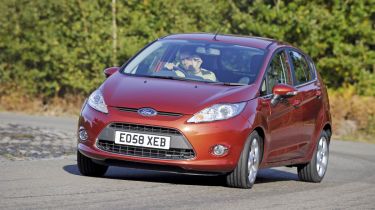Ford Fiesta Zetec
Is our favourite supermini practical enough to win here?
Ask someone to name a supermini, and chances are they will blurt out “Fiesta” without thinking. Ask if they know what a Honda Jazz is and they might be less sure of their response…
The Japanese company is hoping that its latest contender will gain the household name status of its most popular competitors. Although Ford took a very different approach to producing its ideal small hatchback, the Fiesta is named by Honda as one of the models it sees as a rival to its Jazz. And so it should! If you’ve got £12,000 to spend on new car, there are few better places to go than your local Ford dealer – that’s what we found out when the blue oval model wiped the floor with four rivals in Issue 1,035.
However, park the Fiesta next to Honda’s newcomer and not only do they look as though they’ve come from different classes, you could be forgiven for thinking they’ve hailed from different worlds. The Jazz’s honest, simple shape and large, flat features are a stark contrast to the new Fiesta’s swooping lines and enticing details. The Ford looks fantastic in Zetec trim, and makes both rivals here appear heavy-handed in comparison.
Used - available now

2023 Ford
Kuga
47,524 milesAutomaticPetrol2.5L
Cash £19,300
2020 Land Rover
Range Rover Velar
63,000 milesAutomaticDiesel3.0L
Cash £25,995
2020 BMW
X3
48,000 milesAutomaticDiesel2.0L
Cash £23,995
2020 BMW
X3
40,700 milesAutomaticDiesel3.0L
Cash £33,995The Fiesta’s shape is helped by the fact it’s longer than the Honda. Measuring 3,950mm in length and 1,722mm wide, the Ford sticks out 50mm past the Jazz, while being only 27mm wider. The Note is by far the biggest car of our trio, at 4,083mm long and 1,691mm wide.
As you have already read on Page 48, the Jazz really comes into its own inside. However, get into the Fiesta’s driving seat and you sit a lot lower, which immediately makes it feel much sportier. The Ford’s dashboard divides opinion, though. Rather than go for the functional look that has been adopted by Honda, designers have tried to give the Fiesta cabin a more stylish edge.
Its success is limited by the fussy cluster of buttons on the centre console, but the dials look smart and everything is easy to operate. What’s more, achieving the perfect driving position is easy, as there’s greater steering wheel adjustment than in either the Honda or the Nissan.
Unfortunately, all Ford’s good work is undone in the back. Show the Fiesta to a Honda engineer and they will think a couple of levers have been missed off – the seat folding mechanism is so basic it’s made to look half-hearted by both rivals here. The only moving part is the back, which can’t sit completely flat because the squab is fixed in place.
The Fiesta is also the least comfortable of our trio for passengers travelling in the rear. It offers only 660mm of legroom, compared with 720mm in the Jazz and up to 790mm in the Note. There’s not as much head or shoulder space, either, thanks to the body’s swooping shape. With a full complement of passengers on board, the five-door Fiesta has room for 295 litres of luggage.
So before you’ve even turned the key in the ignition, the Ford looks as if it’s on the ropes in this challenge. However, it doesn’t take long behind the wheel to realise where the firm focused its efforts. This car isn’t only good to drive; it’s a revelation. Our test model is powered by the blue oval’s 1.4-litre petrol engine. Admittedly, with only 95bhp on tap it’s the weakest area of the mechanical package. The sprint from 0-60mph was hindered by the fact the driver can’t disable the overactive electronic stability control, and the 12.3-second time was a full 1.2 seconds slower than the Jazz.
Still, at least the Ford has proved itself to be reasonably economical; despite being worked hard, the four-cylinder unit returned 32.7mpg in our hands. Aside from its lacklustre pace, in every other respect the Fiesta is streets ahead. The steering is perfectly weighted, and the car inspires plenty of confidence when turning into a corner, with the nose tracking in rather than pushing wide. There’s barely any body roll, and the playful chassis lets the Ford deliver hot hatch-like handling.
But don’t think for a second it’s not comfortable. Such is the quality of the supermini’s suspension that it offers the smoothest ride in this group. Anyone undertaking a long journey will come out of the Fiesta feeling fresher than in its less relaxing rivals here. There’s only one problem – the Ford isn’t as cheap as it used to be. There’s no doubt that its price can be justified by its all-round abilities, but our test car weighs in at £12,095.
In this company, the Fiesta offers compromised practicality, with no compensation to be found on the price lists. Can its desirability and sharp handling provide enough to keep it at the top of our supermini hit list?
Details
Price: £12,095
Model tested: Ford Fiesta Zetec
Chart position: 1
WHY: New supermini champ mixes strong driver appeal with sharp looks and a huge range.
Economy
The Fiesta is the most expensive car here, but look at the wider picture and it begins to claw back its price premium. It has a 41.1 per cent residual value, so after three years and 30,000 miles, it will be worth £4,971 – that’s £585 more than the Note. The Ford also has the lowest maintenance costs of our trio, which will help to trim owners’ bills. All three cars reside in the same road tax banding, so a year’s disc works out at £120. Disappointingly, though, stability control is a £300 optional extra on the Ford – the safety kit comes fitted to the new Jazz as standard.
Environment
Emissions aren’t as low as the Honda’s, at 133g/km, but the 98g/km ECOnetic – driven in Issue 1,037 – is eligible for free road tax.







